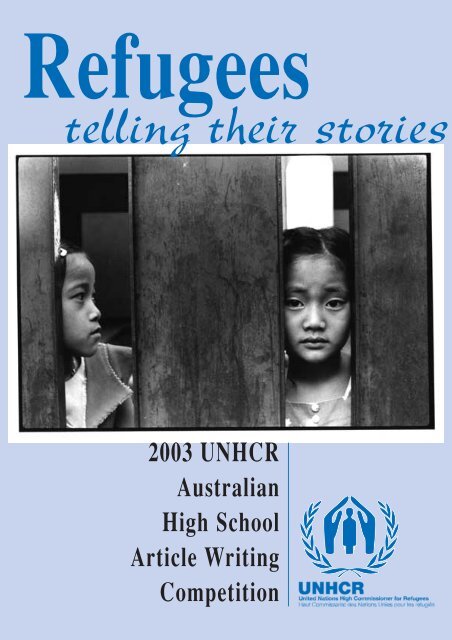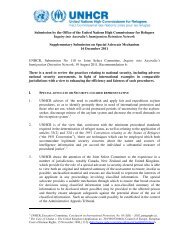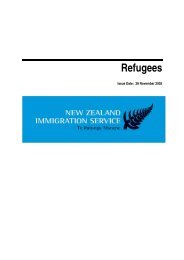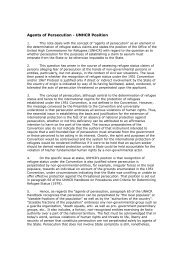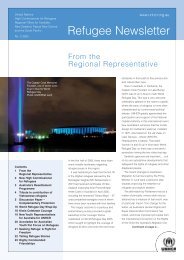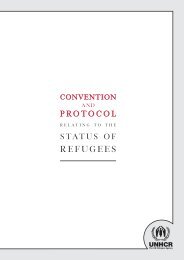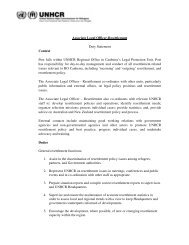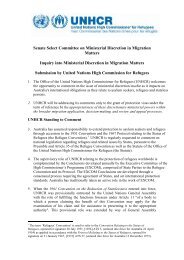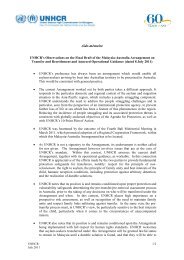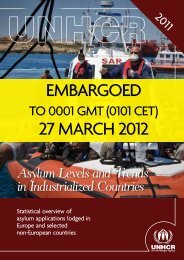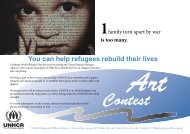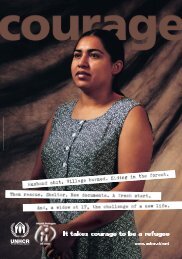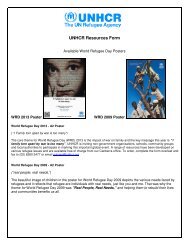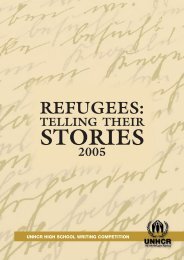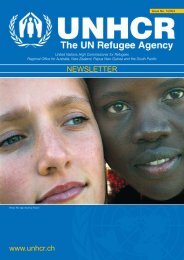5175_ cover - unhcr
5175_ cover - unhcr
5175_ cover - unhcr
You also want an ePaper? Increase the reach of your titles
YUMPU automatically turns print PDFs into web optimized ePapers that Google loves.
Refugees<br />
telling their stories<br />
2003 UNHCR<br />
Australian<br />
High School<br />
Article Writing<br />
Competition
Refugees<br />
telling their stories<br />
Published by:<br />
With thanks to:<br />
UNHCR<br />
Pirion Pty Limited<br />
Truc Nguyen- design<br />
Running Hot Graphics- layout and file preparation<br />
Tim Napper- editor<br />
Cover Photo: J Becket 1997
Introduction<br />
Late in 2003, UNHCR launched a project – the Australian High-School Article Writing Competition - aimed at<br />
raising awareness of refugee issues in the Australian community. The premise for this project was simple:<br />
encourage young Australians to reach out to a refugee in their local community, listen to their story, and write it<br />
down. By talking, communicating and attempting to understand the lives of those that are hidden from us, we hoped<br />
through this project to bring clarity to an issue often fraught with misunderstanding and ignorance. The flow-on<br />
effects from this simple act of communication were significant. Bonds were formed between young Australians and<br />
refugees that never would have existed. This contact between young Australians and refugees (and Australians who<br />
were once refugees) brought into stark contrast the differences in personal histories between interviewer and interviewee,<br />
and shed some light, for many, on how lucky we are to live in a country free of political and religious<br />
oppression. The awareness of refugees living, working and making a contribution to local communities generated<br />
by this project also helped to humanise a group of people that are often depicted as an abstract political problem.<br />
UNHCR was delighted and impressed by the response we received to this competition: delighted by the number of<br />
students willing to take the time to write a story, impressed by the maturity and insight contained within the articles.<br />
We were also impressed and humbled by the candour and dignity shown by all those refugees who were willing to<br />
tell their story. They freely recounted some of the worst moments of their lives, moments that took place at some of<br />
the most tragic sites in history – be it Auschwitz in Nazi Germany, or the final years of the Taliban regime, or the<br />
brutalisation of civilian populations in West Africa over the past two decades – and they did so with wisdom and<br />
honesty. The students found extraordinary stories in everyday circumstances – a father, a schoolmate, a family<br />
friend; from people they may never have considered a ‘refugee’. In the words of one of the finalists: "For this<br />
article I chose my father… I never really thought of him as a refugee or as one who had suffered because he is such<br />
a strong person; but when he told me about his early life, I realised how wrong I was".<br />
UNHCR was also impressed by the historical diversity of the stories we received. That is, from the beginning of the<br />
20th century (Alex’s story of flight from the Russian revolution) to the end (such as Salima’s story of oppression<br />
under the Taliban) we read stories from nearly every troubled place and time in the past century. Each of these<br />
stories, though from different cultures and from different conflicts, often shared a commonality of experiences for<br />
the victims: discrimination and violence; everyday life saturated with fear, and a final, desperate flight from<br />
oppression. To juxtapose these stories is to see that victimhood is not identified by race, religion, or culture; that<br />
victims of the Taliban, or the Nazis, or of the barbaric militias of Sierra Leone, are all worthy, and may all be in need<br />
of our help. Yet, these people are not simply victims requiring sympathy, they are courageous survivors worthy of<br />
respect. These are people who had the courage to leap into the unknown, to leave nation and home, to make untold<br />
sacrifices for the wellbeing of their families. Refugees in many ways are those who refuse to be victims; they are<br />
those who risk everything in order to take control over their own destiny.<br />
This project, though modest in its original conception, received widespread support at a grass-roots level. The<br />
United Nations Youth Association (UNYA) encouraged participation through its members and contacts in high<br />
schools throughout Australia. Anne Simpson from Rural Australians for Refugees, and Eva Sallis from A Just<br />
Australia helped put word of the competition out through their extensive membership networks. We also appreciate<br />
the assistance of Australia for UNHCR (UNHCR’s national association in Australia) who put UNHCR in contact<br />
with two of their goodwill ambassadors - Ian Chappell and Ouma Sananikone – and requested they be part of our<br />
judging panel. Of course, the judges themselves - who in addition to Ian and Ouma, included the Regional<br />
Representative of the United Nations High Commissioner for Refugees, Michel Gabaudan - are also to be thanked<br />
for their time. In addition, the staff at the Public Information section of UNHCR – Ellen Hansen, Sylvana Whyte<br />
and Truc Nguyen – made this project possible through their participation and support. Finally, for the students who<br />
had the goodwill to participate in this competition, and the refugees who had the courage to tell their stories, the<br />
biggest thanks should be given to you – your efforts will only help to encourage understanding and compassion in<br />
the Australian community.<br />
Tim Napper<br />
Project Manager<br />
Australian High School Article Writing Competition<br />
UNHCR Canberra<br />
2
Contents<br />
Introduction . . . . . . . . . . . . . . . . . . . . .2<br />
Contents . . . . . . . . . . . . . . . . . . . . . . .3<br />
Salima’s Story . . . . . . . . . . . . . . . . . . .4<br />
Zia’s Story . . . . . . . . . . . . . . . . . . . . . .7<br />
Razia’s Story . . . . . . . . . . . . . . . . . . . .9<br />
Peter’s Story . . . . . . . . . . . . . . . . . . .11<br />
Adut’s Story . . . . . . . . . . . . . . . . . . .13<br />
Shahram’s Story . . . . . . . . . . . . . . . .15<br />
Halina’s Story . . . . . . . . . . . . . . . . . .17<br />
Phillip’s Story . . . . . . . . . . . . . . . . . .19<br />
Alex’s Story . . . . . . . . . . . . . . . . . . .21<br />
Redwan’s Story . . . . . . . . . . . . . . . . .23<br />
Highly Commended List . . . . . . . . . .25<br />
About the Judges . . . . . . . . . . . . . . . .27<br />
UNHCR bringing Rwandan children home to<br />
be reunited with their families.<br />
Kigali Airport, Rwanda<br />
Photo: H. J. Davies, 1977<br />
3
Salima’s story<br />
by Hallie Kent, Ramona Strang and Salima Haidari<br />
WINNER OF THE UNHCR REGIONAL REPRESENTATIVE’S SPECIAL PRIZE<br />
My name is Salima Haidari and this is my story. I was<br />
born in Ghazni, a small town south of Kabul,<br />
Afghanistan, in December 1988. Until the age of about<br />
eight I lived a fairly normal life for a girl in<br />
Afghanistan – a usual day was cleaning, cooking and<br />
sewing. I did not go to school because the Taliban didn’t<br />
allow girls to go to have an education. Occasionally<br />
I was allowed to spend time with my friend. She lived<br />
in the house joined to mine, but I could not go and see<br />
her unless my father walked with me as young girls and<br />
women were not allowed out on the streets on their<br />
own. If the Taliban soldiers found a woman out on her<br />
own they would kill her, and leave her body where her<br />
friends will see it as a warning.<br />
I rarely got to see my father, as he had to hide from the<br />
Taliban. He hid because he did not want to fight for<br />
them. One morning he went to Kabul in his truck to<br />
sell some firewood and he never came home. The<br />
Taliban caught him and some of his friends and said<br />
they had to become soldiers. My father and his friends<br />
escaped and ran away to Pakistan – we never heard<br />
from him again until we had been in Canberra for ten<br />
Afghan refugees in the Shamsabad<br />
refugee settlement, Iran.<br />
Photo: A. Hollman 1993<br />
months. After he had escaped, my home was visited<br />
regularly by soldiers asking where he was.<br />
Just after I turned seven, soldiers were starting to fill<br />
the streets in small groups; eventually they were everywhere.<br />
They all had a uniform of olive green pants, a<br />
long brown coat and big black boots. They had empty<br />
faces and they all had long, black beards. They carried<br />
guns that had a sharp knife on one end and a hard<br />
block-like object on the other. They abused anyone<br />
who didn’t do what they were told or got in the way.<br />
This is why my six-year-old brother died when I was<br />
ten. He was hit in the head with the end of a soldier’s<br />
gun, because the soldiers thought he was lying about<br />
where my father was. This made us feel angry and<br />
afraid that they might do the same to us. The loss of<br />
my brother filled me with doubt that our family would<br />
ever be safe.<br />
Not long after that my other little brother died. He was<br />
only four years old. One day the soldiers came again<br />
looking for my father. When they questioned my<br />
mother, she told them, "We don’t know where he is".<br />
The soldiers began beating her<br />
viciously with their guns<br />
yelling, "You lie, you lie!" My<br />
mother was holding my brother<br />
and she dropped him on the<br />
ground when the soldiers began<br />
to hit her. My brother’s nose<br />
began to bleed, and then the<br />
blood came out of his mouth as<br />
well. We could not stop the<br />
blood and then he died. The<br />
soldiers found this amusing and<br />
while laughing they told my<br />
young sister with a gun to her<br />
head that she was next. It was so<br />
frightening. Then they got my<br />
father’s picture, the only thing<br />
that could remind us of him, and<br />
burned it to ashes.<br />
After that we tried to keep on<br />
living our lives as normally as<br />
we could in such conditions. The<br />
gunshots and screaming did not ever seem to stop and<br />
everybody was always afraid. The windows were<br />
boarded and the locks on our door were useless. At<br />
4
night the soldiers often came to our<br />
house; they would take our blankets<br />
saying, "Why are you sleeping with a<br />
blanket?" leaving us cold, sleepless and<br />
sick all the time. It made me feel<br />
helpless that my mother was always sad<br />
and she didn’t want to live anymore. It<br />
was like her life had drained out of her<br />
body.<br />
In every home there was fear and people<br />
were always crying. There was never any<br />
happiness. When the soldiers were near<br />
your door you had to be very quiet, you<br />
even had to breathe quietly. You could<br />
never trust any man in the street because<br />
he might be a soldier. It had been four<br />
years and we hadn’t heard anything from<br />
our father. There are no telephones or mail – there was<br />
no way that he could contact us and we didn’t know<br />
that he had escaped to Pakistan. We thought he had<br />
been killed.<br />
One day my grandfather had had enough and he tried<br />
to convince my mother to take us and leave the<br />
country, pushing his life-savings into her hands. At first<br />
my mother did not take the money saying "I can’t leave<br />
you here with nothing" and he replied "I am old. I have<br />
lived my life. Look at your children! They are always<br />
afraid and they have their whole lives ahead of them,<br />
they shouldn’t die here". Then she said "But I am a<br />
woman. What will I do? Where do I go? No-one will<br />
listen to me or help me!" Then he slapped her across<br />
the face and said, "LEAVE!" and walked away. I was<br />
so angry with my grandfather because he hit my<br />
mother, but now I can see that he saved us. After my<br />
mother had stopped crying she stood up and said "We<br />
are leaving" but I still didn’t feel any hope. I kept<br />
thinking my mother was crazy. What was she getting us<br />
into? We would never survive. And I asked her "Where<br />
are we going? We will never get away, maybe we<br />
should just stay." When I said this, my mother got very<br />
angry and said "No! We have to try and escape. If we<br />
just stay then we will die and we wouldn’t have tried.<br />
It’s easy for your brothers and father, they are already<br />
dead." After my mother said this I thought to myself –<br />
‘So what if we are women, we are the same and we can<br />
survive’.<br />
We went home and packed only what we needed –<br />
water and bread. We walked for a whole night and day<br />
and we were exhausted. We met three other families;<br />
two of them were also missing husbands and all three,<br />
the same as us, were fleeing from our country. They<br />
had a truck. They said we could travel with them so we<br />
would not have to walk anymore. The two men were<br />
Afghan refugees returning to Kabul.<br />
Photo: R. LeMayne, 1996<br />
driving but the women and children were forced to hide<br />
behind a stack of potatoes and tea. If we were<br />
dis<strong>cover</strong>ed then we would all have been shot and the<br />
men would have been used as soldiers. We arrived in<br />
Pakistan and we stayed for three days, staying in a<br />
cheap and dirty hotel, keeping out of sight. On the<br />
fourth day a man approached us and said, "If you give<br />
me four thousand American dollars for each person<br />
then I will get you to another country that is safe for<br />
your children, but you have to be very careful that the<br />
police or security don’t see you."<br />
On the fifth day he returned and we left. We traveled<br />
by truck for three or four days. Our food was so low<br />
that we could only feed the younger children. After<br />
what seemed like forever we arrived in a place called<br />
Karachi. We stayed there overnight and the next day<br />
we were on a plane going to Indonesia. After a<br />
two hour trip, we arrived. There we stayed eleven days<br />
in a house that was very small, with a smell that was so<br />
bad I couldn’t breathe. We had to share two bedrooms<br />
between four families. On the eleventh night we caught<br />
a bus – we traveled for five hours and then we boarded<br />
a boat with three hundred and sixty other people.<br />
The boat was so crowded! We had been promised a<br />
boat that had a room for every family, toilets in every<br />
room, a swimming pool and a restaurant! But the boat<br />
we had was very dirty and it seemed like it would break<br />
apart at any time. There were three levels and I was<br />
stuck in the bottom level next to the engine; it was so<br />
loud and smelled so bad, and I felt so sick. People vomited<br />
over me, in my face and all over me. When people<br />
died they just threw the bodies into the sea. While we<br />
were in the middle of the ocean the boat broke down.<br />
5
Luckily there was a man who knew a bit about<br />
mechanics and he fixed the boat – after that he was<br />
very popular! After four nights and days we arrived in<br />
Christmas Island, Australia. But even though we were<br />
in Australia there were soldiers pointing guns at us.<br />
Our boat was told to go back by the police.<br />
Although I was afraid of the guns I knew the soldiers<br />
were not like the soldiers back home. They put us in<br />
what looked like a big gym where we had lots and lots<br />
of food. I have never eaten so much in my life! Even<br />
when I wasn’t hungry anymore I still kept eating. There<br />
were clean showers and toilets, and everyone was<br />
always fighting, pulling hair, kicking and punching just<br />
to use the toilets. Even with all the fights I thought ‘I<br />
have made it, we survived!’ After that we were sent to<br />
the Detention Centre in Port Hedland. We stayed there<br />
for three months, and although it was safe it was a lot<br />
like a jail. We had very small rooms and the security<br />
guards were constantly checking on us, but I knew I<br />
wouldn’t have to be afraid for my life.<br />
After that we were sent to Canberra and I was so<br />
excited. I still can remember coming to Canberra at<br />
twelve o’clock at night and seeing all the lights of the<br />
city and thinking, ‘Perhaps I am in heaven!’ When I<br />
saw Parliament House, I thought it was made out of<br />
paper or something. Then we arrived at a hotel in<br />
Civic. It was like a palace, when I saw it I felt like a<br />
queen! It was so clean and we were not cramped<br />
anymore. When I saw the elevator I thought "What is<br />
that?" When I got in it and it started to go down, I was<br />
screaming and crying, then when it got to the kitchen I<br />
was thinking "It can read minds, WOW!", because it<br />
stopped when I reached the kitchen.<br />
about 11 or 12 of them - were trying to hit us with fruit.<br />
So we retaliated and pelted them with fruit. Soon I<br />
befriended three girls: Hallie, Ramona and Anne. They<br />
are good friends: they are always here for me when I<br />
need them and accept me for who I am. At the end of<br />
the year I met my teacher. My first impression of her<br />
was that she was OK, but I got to know her when<br />
school went back after the holidays - she was really<br />
nice and so I told her my story. Now whenever I feel I<br />
need to talk to someone about something I tell her<br />
because I know I can trust her.<br />
Still we are waiting to see if we have to go back to<br />
Afghanistan. Always we are waiting and not knowing<br />
if we will stay or if we will go. It is very hard to live<br />
not knowing what will happen in your life. I have<br />
thought I will kill myself if I have to go back. I am<br />
afraid we will be all killed if we go back – the soldiers<br />
will punish us. My sister Fatima is five years old – all<br />
the time she asks me "How will the soldiers kill us<br />
when we go back?" and she cries every night. When I<br />
try to go to sleep at night I don’t want to close my eyes<br />
because I see all the faces of the dead people in the<br />
water. If I can stay in Australia I want to be a doctor or<br />
a nurse. If I was a doctor or a nurse I could have saved<br />
my little brother from bleeding to death.<br />
But my story is better than the stories of others. At least<br />
I have had some good times and I have learned how to<br />
laugh and be happy. I go to school and I have most of<br />
my family.<br />
My name is Salima Haidari and this is my story.<br />
We stayed in the hotel for a couple of months, then<br />
finally moved to a house for people whose families had<br />
separated. We lived there four about 10 months and one<br />
day when we came back from a picnic and there was a<br />
phone call. I picked up the phone and a woman told me<br />
there was a man in Canberra and maybe he was my<br />
father; but she told me not to tell the others because if<br />
it wasn’t my father they would be so disappointed. The<br />
next day they arranged a meeting for my family and<br />
yes! – it was our father and we were so happy because<br />
we had finally found him after five years. Now we<br />
were crying tears of joy!<br />
After we found our father we had enough money to<br />
rent a house for our family. My first day at school was<br />
very confusing. I didn’t think I would make any friends<br />
but some people were nice to me and they stuck up for<br />
me when some students called me Osama Bin Laden’s<br />
daughter. I was very shocked when they called me that.<br />
Also on the first day of school a lot of boys - there was<br />
Ramona Strang, Salima Haidari, and Hallie Kent<br />
6
Zia’s story<br />
by Angela Ziaei, aged 14<br />
THIRD PLACE<br />
For this article I chose to interview my father, Zia<br />
Ziaei. I never really thought of him as a refugee or as<br />
one who had suffered because he is such a strong<br />
person; but when he told me about his early life, I<br />
realised how wrong I was.<br />
His story begins in his home country, Iran, with his<br />
three brothers, two sisters and his parents. Most of his<br />
childhood was spent in a big house in Isfahan. Every<br />
day he had to walk a few kilometres to the nearest<br />
school. Although he was a good student and always the<br />
top of his class, he had been expelled from several<br />
schools for one unjust reason: he and his family were<br />
Baha’is.<br />
The Baha’is had been persecuted for more than a<br />
century, but after the Islamic revolution in Iran in 1979,<br />
things became even worse. Baha’i properties were<br />
confiscated, assets were set to fire, well known Baha’is<br />
imprisoned and those who did not convert to Islam<br />
were put to death.<br />
School was often bad enough without everyone<br />
knowing he was a Baha’i, but once the teachers found<br />
out, they would go out of their way to hurt and beat<br />
him. Zia often found himself hiding in a toilet cubicle.<br />
The students were also religiously prejudiced. They<br />
would throw rocks and beat him up whenever he<br />
wasn’t with his close group of friends (who didn’t care<br />
Afghan refugees in the Subzevar transit centre, Iran<br />
Photo: A. Billard 1985<br />
7
what religion he was). Eventually, the teachers and<br />
majority of students would have their way and Zia<br />
would be expelled.<br />
Zia wasn’t the only one in his family to be discriminated<br />
against. They all suffered by losing jobs or being<br />
expelled from university. Their property was<br />
confiscated, their belongings stolen – even their<br />
marriages were not considered legal by the government<br />
and therefore births were not officially recognised.<br />
Even worse, a powerful section of the population<br />
wanted the Baha’is dead.<br />
In 1983, when Zia was seventeen, his older brother<br />
arranged to meet a Balouch man (someone who lives<br />
on the border). The man knew the off-road tracks from<br />
Iran to Pakistan and agreed to take them there in secret.<br />
My dad’s family had to sell many of their belongings to<br />
raise enough money to pay the man. They couldn’t sell<br />
the house because people would be suspicious but they<br />
managed to pay 100,000 Toomans (Aus$24 000) to<br />
take the whole family.<br />
His family traveled in small groups. Zia went with his<br />
sister, her husband and her two little children. At first<br />
the journey was frightening and extremely risky, for if<br />
they were caught, they would have been forcefully<br />
questioned, beaten, put in jail, and maybe even killed.<br />
My father told me that some people who were caught<br />
trying to escape Iran ‘were shot on the spot without<br />
questioning.’<br />
who were quiet and polite. Once they were in Australia,<br />
Zia and his family settled into Adelaide with the help<br />
of the Baha’i community. In particular, the youth of<br />
this community helped them to fit in by sharing stories<br />
and jokes.<br />
One of the hardest challenges for Zia was learning<br />
English. After six months he began to ‘see the light at<br />
the end of the tunnel’. School was also different and<br />
difficult, and he had to repeat year eleven because of<br />
language barriers. However, Zia persevered, and after<br />
high school went to Flinders University to study<br />
Biology. He earned a degree in Microbiology and then<br />
studied computing. After he graduated he began<br />
working at various places; he taught computing at<br />
TAFE, became a manager at Australia’s Central Credit<br />
Union, and now he has his own successful business<br />
called Global TechNet.<br />
Zia has now lived in Australia for over half of his life.<br />
He said that one of the most positive aspects of living<br />
in Australia was marrying an Australian wife and<br />
having a loving family.<br />
For four cruel days in the oppressive heat of summer,<br />
the escape continued. His brother-in-law lost fifteen<br />
kilograms from a combination of food poisoning,<br />
dehydration and lack of food. They could hardly walk<br />
or talk because of sunburn and dehydration. After Zia’s<br />
sister became ill from malaria, things began to look<br />
desperate. However, in Pakistan, some poor yet<br />
generous people were willing to help them survive, to<br />
help them keep going.<br />
They were interviewed by the UNHCR and were<br />
granted refugee status soon after their arrival in<br />
Pakistan. After thirteen months of waiting in Pakistan<br />
they were finally accepted to immigrate to Australia.<br />
Before arriving, Zia thought Australia would be a ‘nice<br />
and tidy place’, with many blue-eyed, fair-skinned<br />
people who lived comfortably. He also thought that<br />
there would be new toilets and schools with students<br />
Angela and Zia Ziaei<br />
8
Razia’<br />
s story<br />
by Anja Ivanovic, aged 16<br />
She stands in the school corridor, giggling with her<br />
friends, no more distinguishable from the adolescent<br />
crowds than the next girl. Yet, the life that she has<br />
lived, the things she has seen, and how much she has<br />
suffered, distinguishes her greatly from these fellow<br />
students in a country she has only just recently begun<br />
to call home. This is her story.<br />
"I do not have good memories of living in my country,"<br />
Razia Danesh, a 16-year-old Afghani refugee, tells me.<br />
"Sometimes it was good. Mostly, it was bad."<br />
Razia was about seven years old when the Taliban<br />
came into power. She remembers the fear they all lived<br />
in. "The Taliban were extremely religious. It was a<br />
requirement to pray a number of times a day. If men<br />
were seen clean-shaven, they were beaten. Women had<br />
to wear the Bourka (a long, cloak-like garment which<br />
<strong>cover</strong>s all of the body, with a small opening for the<br />
eyes) or they too would suffer at the violent hands of<br />
these soldiers. It was a most terrifying time."<br />
The Danesh family, which consisted of Razia, her three<br />
younger siblings and her parents, lived in a small<br />
village called Ghazni. They belonged to the middle<br />
class, owning a shop two hours away from their home<br />
and a block of land for growing crops. Life was tough,<br />
but they got by.<br />
Razia’s world began to fall apart when her father was<br />
arrested in 1998. He was on his way to work and never<br />
returned home. The family was notified by local<br />
villagers five days after the disappearance; they were<br />
told that their father had been arrested by the Taliban.<br />
Afghan refugee in Ghousabad, an urban slum in Quetta, Pakistan.<br />
Photo: Benatuar 2001<br />
9
They were advised to pay a ransom if they<br />
ever wanted to see him again. The family<br />
obeyed the orders, and Mr. Danesh<br />
returned home shortly after.<br />
Life resumed as normal, until tragedy<br />
struck the family once more in December<br />
2000 - Razia’s father was arrested for the<br />
second time, never to be seen again. At<br />
this point, Razia’s mother had reached<br />
breaking point and wanted out. Life<br />
without her husband was extremely<br />
difficult, as women had virtually no rights<br />
or opportunities for employment in<br />
Afghanistan.<br />
In June 2001, a man came to the home of<br />
the family and promised them a way out<br />
of Afghanistan. The family, after paying<br />
the smuggler in American dollars,<br />
boarded his jeep. They hid in the back as<br />
the jeep crossed the border. Razia was<br />
never sure what their final destination<br />
would be; all she wished for was a<br />
better place.<br />
The family stayed in hiding for five days, until one<br />
night they boarded a plane for Jakarta. Razia<br />
remembers how frightened they all were when they<br />
realised they were in the air; they had never dreamt of<br />
such a thing. "I think about it now and I laugh. But then<br />
it was so scary. My mother panicked, however my<br />
brothers were having fun. Personally, I was excited by<br />
it all. Even though I was scared, I looked forward with<br />
excitement to the future."<br />
Afghan refugees at the Munda<br />
refugee village, Pakistan.<br />
Photo: A. Hollman, 1990<br />
"I want to be a doctor," Razia tells me. "Now that I<br />
have had a taste for education, I cannot get enough."<br />
When I ask her if she is proud of her heritage, she says<br />
most definitely. "I am proud of being an Afghan. I will<br />
teach my children our customs, just as my mother has<br />
taught me. She was so brave to bring us here on her<br />
own. I am determined to make her proud."<br />
When asked if Australia is the answer to her dreams,<br />
Razia states that it is all that and more. "Freedom and<br />
education are the best things. My life is so different<br />
now. It is so much better." She remembers the boat trip<br />
coming over here. "It was so cramped, so hot and dirty.<br />
But I do remember one night, looking out and seeing<br />
nothing but ocean - it was then that I began to feel truly<br />
alive."<br />
Razia and her family spent three months at the<br />
detention centre in Port Headland, Western Australia.<br />
It was here that Razia and her siblings attended school<br />
for the first time in their lives. The worst thing about<br />
the centre was the insecurity she felt about her future,<br />
"All we wanted was freedom."<br />
With their freedom granted in September 2001, the<br />
Danesh family now attempt to live a simple life, and<br />
are hopeful for the future, a future which might, with a<br />
little outside help, include a reunion with their father.<br />
Anja Ivanovic (Razia Danesh was not available)<br />
10
Peter’<br />
s story<br />
by Jessica Dornan, aged 16<br />
It was midnight, the 4th of September 1961, less than<br />
a month after the secret construction of the Berlin<br />
Wall. Peter Lengefeld and his friend trudged through<br />
the dark forest, which lay on the border between East<br />
and West Germany, and also represented the<br />
boundary of the infamous Iron Curtain. Before them<br />
lay freedom – freedom of speech, freedom of opinion,<br />
freedom of choice; behind them lay the German<br />
Democratic Republic, ruled by the oppressive<br />
Communist regime of Russia.<br />
Their trek from their<br />
hometown had begun<br />
the previous day, with a<br />
fifty-kilometre journey<br />
by train, followed by a<br />
fifteen-kilometre walk,<br />
which was <strong>cover</strong>ed by<br />
the shroud of darkness<br />
and secrecy.<br />
Seventeen-yearold<br />
Peter and his<br />
companion had only a<br />
vague direction of the<br />
path they should choose<br />
to reach their longdesired<br />
freedom. They<br />
had told no one of their<br />
departure; Peter knew<br />
his family would fear<br />
not only the landmines<br />
surrounding the border,<br />
but also the possibility<br />
that he could be caught<br />
and thrown into jail.<br />
The border was highly<br />
protected, and only<br />
people who lived in the<br />
vicinity held the special<br />
permits necessary to<br />
gain legal access to the<br />
area. This, along with<br />
the Berlin wall, was a<br />
part of the government’s<br />
plan to stop,<br />
according to Peter, the<br />
"bleeding of young<br />
Eastern Europeans in a German refugee camp at the<br />
end of World War II.<br />
Photo: UNHCR, 1953<br />
11
people away from East Germany; they were leeching<br />
out by the thousands".<br />
Although there was no fence to mark the border, the<br />
area was cleared, and according to the stories,<br />
planted with landmines. Peter tripped and fell in the<br />
clearing, and, as he looked up, saw, in the light of the<br />
full moon, an alarm wire, which would alert guards of<br />
anyone who dared go between the East and the West.<br />
He quickly warned his friend and they were able to<br />
pass around the alarm and safely complete their trek<br />
to freedom.<br />
Once in West Germany, Peter experienced living in<br />
two refugee camps, the first being Giessen, the<br />
central camp for East German refugees, where he<br />
spent four weeks. After he indicated that he wanted<br />
to connect with relatives in the state of North Rhine<br />
West Phalia, he was moved to a refugee camp in the<br />
city of Paderborn. Both camps had very good living<br />
conditions and supplied the refugees with everything<br />
they needed – food, clothing and shelter.<br />
The culture and language in both parts of Germany<br />
were the same, but the standard of living was greatly<br />
different. The East German people lived in poverty;<br />
many gave their homes away, because the house<br />
value was so low as people had no money to maintain<br />
them. The nations in the communist bloc, including<br />
East Germany, were bankrupt. Peter revealed that it<br />
was not the “workers’ paradise” we were led to believe<br />
it was. West Germany was the opposite, with healthy<br />
standards of living, and was seen as a haven for freedom<br />
by the East German youth. Despite these newfound<br />
freedoms, Peter was estranged from his homeland.<br />
Had he gone back at any time, he could have<br />
been charged for illegally leaving the country, and be<br />
thrown in jail.<br />
Soon settled into the West German lifestyle, Peter<br />
became qualified as a ‘toolmaker’, and later joined<br />
the West German Police Force. In 1968, Peter married<br />
Rita, but in 1972, at age 28, Peter’s employment<br />
with the police force ended because of his recurring<br />
stomach ulcers. The couple then had thought they<br />
would go on a world trip, but, partially because of<br />
assisted passage, Peter and Rita, along with their baby<br />
daughter Nicole, decided to stay in Australia after<br />
coming to the nation in 1973. Language barriers (as<br />
neither spoke much English), nearly no friends or<br />
relatives, and the heat (especially at Christmas, when<br />
they expected snow and cold) posed problems to the<br />
immigrants, but these obstacles were soon overcome.<br />
Since settling in Australia, their second daughter<br />
Nadia was born. Peter and Rita have found that<br />
Australians are far more relaxed than German people,<br />
and the stress levels in Australia are much lower.<br />
They much prefer to live here than in the rigid<br />
lifestyle of Germany.<br />
Peter had been a political refugee from his home<br />
country since the age of seventeen, and in 1993, Peter<br />
saw his parents for the first time in over thirty years.<br />
Even though this period of separation from his<br />
family had brought pain and loss, Peter believes his<br />
decision and the freedom it brought for his children<br />
were worthwhile, and never would have been<br />
achieved had he not made his initial daring decision<br />
to leave East Germany.<br />
Peter Lengefeld and Jessica Dornan<br />
12
Adut’<br />
s story<br />
by Sophie Weldon, aged 14<br />
FIRST PLACE<br />
Sudanese refugees in the Fugnido Camp, Ethiopia.<br />
Photo: M. Amar, 1989<br />
"I closed my eyes and wished that it all would go away:<br />
the pain in my heart, the loss of my mother and family,<br />
and the terror of the war. Hope was a vision that riddled<br />
my dreams, dreams of happiness and love. Hope was<br />
like a burning flame inside of me. A flame that kept me<br />
going and I kept feeding to sustain. Why me? Why me?<br />
I ask. I was eight when the war broke out in my town,<br />
forcing me to flee my school as it was being bombed,<br />
without even being able to find my parents: that’s when<br />
it all started. In the confusion I found my brother, and<br />
my three-year-old cousin Abuk who was wandering,<br />
scared and alone and my friend Deng.<br />
Two months after our escape from the bombs at our<br />
school we reached the displacement camp at Torit,<br />
however the fighting overtook us again and we were<br />
told to keep moving. Keep moving I told myself; just<br />
keep moving. I grew up inside and outside. No voice of<br />
a mother or father to guide me, only the responsibility<br />
for Abuk, and the sound of Deng’s voice - only<br />
slightly older than mine - urging me on towards an<br />
unknown future. I can’t remember my birthdays; one<br />
day I was nine and the next I was ten.<br />
Like a procession of mourners, with our heads bowed<br />
low we headed for our future amidst the heat waves<br />
and landscape of the desert. Two years later we reached<br />
Kakuma camp. 946027…946027…946027… that was<br />
my new name. From now I shall be a number in a file<br />
and my name, Adut Dau Atem, shall have no meaning<br />
or significance. No longer shall I be a person but rather<br />
a number that defines who I am. The UNHCR had<br />
given us a refugee number. I was not a child anymore<br />
but a refugee.<br />
We were in the camp for 4 years when one day, out of<br />
nowhere, my father arrived. He had been released from<br />
prison and had searched for two years on foot to find<br />
us. Three years later we were accepted into Australia as<br />
part of the offshore refugee programme. We were very<br />
13
happiness and anguish but<br />
the differences in the people<br />
that surrounded us. I can’t<br />
relate to having the<br />
responsibility for caring for<br />
an orphaned child like Abuk<br />
when only eight years old,<br />
or to not know where your<br />
parents were for so long -<br />
especially in those crucial<br />
years when a child needs a<br />
mother and father’s love<br />
and care and knowledge of<br />
the world. I had once tried<br />
the 40 hour famine and had<br />
raised money when I was<br />
12, but to always be hungry<br />
and never have any choice:<br />
how would I survive if I<br />
were in her place?<br />
Sudanese refugees in the Fugrido Camp, Ethiopia.<br />
Photo: M. Amar 1989<br />
grateful for this but I was also very sad, as I had to<br />
leave my cousin Abuk behind, to whom I had been like<br />
a mother for so long. I had to leave Abuk as she wasn’t<br />
part of my immediate family. When I had to tell Abuk<br />
and say goodbye, my heart felt like it would bleed to<br />
death. I tried to speak fairly to her. ‘Look, if I am going<br />
I want you not to feel bad, please try to live,<br />
concentrate on your life, never give up hope.’ It was<br />
hard for her, she thought she was coming with us and<br />
then all of a sudden things changed. She was very, very<br />
upset but she did not say anything, she just stood there<br />
in silence. The day we left she was unable to talk. I’ll<br />
never forget it.<br />
I sat there with the notes of<br />
the interview in front of me<br />
and re-read Adut’s last email written in her<br />
faltering English:<br />
"Dear Sophie, I had read the written story. Sophie you<br />
have done very well. I have no comment at all and very<br />
happy that you wrote exactly the way I would have<br />
done it. Thank you sister that you pass my message to<br />
almost every one. I love you all. Adut."<br />
Tears roll down my cheek, but they aren’t tears of<br />
sadness or tears of happiness; they mix together and<br />
somehow form tears of hope.<br />
I want Abuk to be back beside me again. I want her to<br />
be sharing my chance for an education and a safe life.<br />
Now she will have no one - her parents were never<br />
found. Many times I have regretted leaving her and<br />
coming to Australia without her, but I didn’t have a<br />
choice. I am now 18 and I think about how I live here,<br />
in comfort and safety, and I remember not just Abuk<br />
but all the children in Kakuma who still do not have<br />
enough food to eat."<br />
I press the stop button on the tape recorder and slide<br />
back in my chair, realising how amazingly different<br />
two lives can be. Not only the measure of pain, love,<br />
Sophie Weldon and Adut Dau Atem<br />
14
Shahram’<br />
s story<br />
by Nicholas Bayley, aged 17<br />
SECOND PLACE<br />
The sun had long set, night wrapping itself around the<br />
building in which we sheltered. I sat clutching my<br />
suitcase, which along with the clothes on my back,<br />
were now my only personal possessions.<br />
I was a marked man, guilty of only one thing - my<br />
faith. My future had been stolen from me just as it had<br />
begun. A revolution had occurred in my home country<br />
of Iran during my final year of schooling. We Baha’i<br />
were relentlessly persecuted, denied freedom, and<br />
given no opportunities for education or employment.<br />
The government had begun to persecute many of its<br />
citizens. They had threatened my family and after a<br />
year in hiding I finally decided that I must leave, for<br />
my own safety and that of my family. I had paid a<br />
‘human smuggler’ a large amount of money to<br />
transport me safely into Pakistan.<br />
Soon, I found myself huddled in a safe house in the<br />
border-city of Zahead, listening intently for any sound<br />
that would belie any approaching danger. We could not<br />
be caught. It was around midnight when the smugglers<br />
came for us. Eighteen of us crammed into a single Jeep<br />
Cherokee and drove through town <strong>cover</strong>ed, concealed<br />
from the eyes of the guards.<br />
We left the town behind us as our jeep began to work<br />
its way through the bush. After an hour we left the<br />
vehicle behind and continued on foot. The night was<br />
long as we worked our way through the rugged terrain<br />
towards the border, hoping to cross unnoticed. It was<br />
only as the sun began to rise that we finally reached<br />
the border, where we found two utes waiting for us.<br />
Afghan refugees trading in the Golshahr quarter, Mashhad, Iran.<br />
Photo: A. Billard 1985<br />
15
Again we piled into the cars; this time there was seven<br />
of us to each ute as we set off into the world of<br />
Pakistan. The heat of the desert was oppressive and my<br />
stomach was empty, I had not eaten for nearly two<br />
days, and between all of us there was only four litres of<br />
water. The ute frequently became bogged in the sand,<br />
whereupon we all would have to get out and push it<br />
free.<br />
As the day drew on it became increasingly apparent<br />
that we were lost, driving aimlessly in the vast desert.<br />
The heat was unbearable, three of my companions had<br />
already passed out, whilst another sat next to me, dry<br />
retching continuously. It was then, as the sun began to<br />
descend, that the ute again became trapped in the sand.<br />
We had not eaten for so long that we did not have<br />
the strength to pull it out. Our water supplies were<br />
dangerously low. There was only one thing left to do: I<br />
prayed. I prayed that we would be spared, or that we<br />
would be granted a swift death instead of suffering the<br />
heat of the desert.<br />
in my native Farsi, as my desperation poured from my<br />
heart. Though he could not understand a word of what<br />
I said, my story moved him to tears. I am not proud of<br />
what I did, but he was a good man, and keeping true to<br />
his word I was given an interview in two months. I was<br />
fortunate enough to be accepted and I arrived in Perth<br />
on the 31st of August 1988.<br />
I have spent my time in this country well, initially<br />
living in Perth, before moving to rural Victoria and<br />
now to Melbourne. I have had the chance to travel and<br />
see many of the wonderful sights Australia has to offer.<br />
Australia has exceeded all of my expectations; truly it<br />
is one of the greatest countries in the world in which a<br />
man could ever live. I was lucky enough to have a<br />
chance to live in this country and it is never something<br />
I will regret. Now, when people ask me where I am<br />
from, I proudly call myself an Australian.<br />
It was perhaps an hour later that we heard the noise of<br />
an engine. A car drove towards us, though it was not<br />
one our guides recognised, and as it pulled up we could<br />
see that the men were all heavily armed. They were<br />
drug smugglers. They asked us what we were doing<br />
and upon hearing that we wanted to go to Pakistan,<br />
they replied that we had become so lost we had crossed<br />
into Afghanistan. They winched our ute out of the sand<br />
and pointed us in the direction of Non Qualdi, our<br />
original destination.<br />
It was late that night when we arrived in the city and in<br />
a few days I was able to apply for refugee status with<br />
UNHCR. From there I journeyed by train to Lahore, a<br />
tiring trip of thirty hours. My only relatives outside of<br />
Iran had been my cousins who had journeyed to<br />
Australia. In Lahore I was able to obtain their sponsorship<br />
and applied to the Australian embassy for a<br />
visa. I waited for two years. I have forgotten how many<br />
times I visited the embassy, and how many times I was<br />
denied even an interview. I lived in small rented houses<br />
near Lahore, and as time passed I grew more and<br />
more desperate.<br />
In the end I was forced to throw myself in front of<br />
the car of an immigration official, shouting that I<br />
desperately needed to speak with him. I spoke to him<br />
Nicholas Bayley<br />
Shahram Niazian<br />
16
Halina’<br />
s story<br />
by Braden Cichinski, aged 16<br />
On the 12th of August 1944, Halina Czaplinski found<br />
herself living a nightmare. The Warsaw uprising had<br />
failed and Halina, along with many others had been<br />
transported to Auschwitz. She was nineteen.<br />
Life in the Nazi death camp brought many horrors. "I<br />
will never forget the dead bodies piled up, broken and<br />
discarded, arms and legs intertwined,"<br />
Halina said. For an agonising two months<br />
she endured the endless hunger, fear and<br />
cold. Her eyes witnessed untold horrors.<br />
The destruction of her beloved homeland, the new<br />
ruling communist regime, poverty, hunger and a life<br />
with no prospects motivated Halina and her husband<br />
(she had married in the meantime) to leave their<br />
country. On the pretext of visiting Halina’s brother in<br />
Austria, the Czaplinskis left their homeland. Halina<br />
knew they would never return. "I expected to be forced<br />
Prolonged exposure to the harsh conditions,<br />
lack of nourishing food and shared<br />
unhygienic facilities led to illness for many<br />
prisoners. Halina was no exception,<br />
contracting typhoid. As there was no room<br />
in the camp hospital, for three days she<br />
shared a bed with a dead prisoner. Seeing<br />
the mountain of dead bodies growing<br />
outside, Halina feared the worst. "I was so<br />
young, so afraid to die," she remembers.<br />
Halina’s saviour came in the guise of a<br />
German doctor, who administered three life<br />
saving injections. She survived.<br />
As the Nazi forces were retreating,<br />
Auschwitz inmates were moved to Bergen-<br />
Belsen in Germany. It is here Halina and her<br />
fellow prisoners finally experienced<br />
freedom when the Allied Forces liberated<br />
the camp on the 5th of May 1945. When the<br />
allied forces rolled into camp, these emaciated<br />
scraps of humanity, which barely<br />
resembled humans, lifted one military<br />
vehicle right off the ground in sheer joy.<br />
She smiles, "Can you imagine it?"<br />
Through the efforts of the Red Cross, Halina<br />
was transported to Sweden to begin the<br />
process of convalescence. She weighed only<br />
34 kg. She remembers Sweden fondly. The<br />
people were compassionate and treated the<br />
Polish refugees with kindness and respect.<br />
After six months, Halina returned to what<br />
was left of her homeland only to find<br />
Warsaw in ruins, the townspeople eking out<br />
an existence from almost nothing,<br />
living like rats in cellars.<br />
Polish refugees in the Traiskirchen transit centre, Austria.<br />
Photo: I. Guest, 1982<br />
17
was the summer<br />
heat. The first few<br />
precious Pounds she<br />
and her husband<br />
earned were spent<br />
purchasing a fan.<br />
European refugees departing for the USA.<br />
Photo: UNHCR, 1951<br />
to go back by the authorities. It wasn’t till we reached<br />
Austria that I relaxed and felt safe."<br />
On the 30th December 1948, Halina arrived in<br />
Adelaide on the Neptunia. Her lack of English caused<br />
her many difficulties. She carried a dictionary with her<br />
everywhere she went. Due to her poor English there<br />
were few job opportunities. Initially Halina cleaned<br />
homes until she was employed at Caroma, where she<br />
worked for 18 years. Halina’s husband got a job as a<br />
bricklayer; they both worked hard to make ends meet.<br />
She regrets that there was no time to learn English<br />
properly, but work came first for Halina. Generally the<br />
Australians she met were kind and helpful; she did not<br />
encounter any racism. She met other Polish refugees<br />
and became a part of the emerging Polish community<br />
in Australia.<br />
She knew very little about Australia, so each day of<br />
living here was a learning experience. She expected<br />
Australia to be similar to Europe but was pleasantly<br />
surprised at the differences, although initially she<br />
thought of the land as rather desolate and empty. It was<br />
difficult to adjust to this landscape after the very<br />
different climate of Europe. What struck her the most<br />
Halina believes there<br />
are many positives<br />
about living in<br />
Australia. She doesn’t<br />
think there is a<br />
country like<br />
Australia anywhere<br />
else in the world!<br />
She believes that<br />
the medical care,<br />
especially for the<br />
aged is fantastic.<br />
Halina doesn’t have<br />
to worry that she<br />
will have to go to<br />
bed hungry anymore, and enjoys the high standard of<br />
living and political freedom Australia offers. She owns<br />
her own home, which Halina and her husband managed<br />
to build only five years after their arrival in this<br />
country.<br />
With time, Halina’s ties within the Polish community<br />
have grown strong. With her husband she supports the<br />
Polonia Soccer Club and the Polish Ex-Servicemen<br />
Association. Halina Czaplinski has no regrets. She is<br />
convinced that leaving Poland was the best decision<br />
she ever made.<br />
Halina Czaplinski and Braden Cichinski<br />
18
Phillip’<br />
s story<br />
by Ben Horne, aged 16<br />
When Phillip Tran fled his<br />
homeland, Vietnam, at the<br />
age of twelve, he had no<br />
idea of the horrors that he<br />
would come to face over<br />
the next four years of his<br />
life. "My father asked me if<br />
I wanted to go to a better<br />
place, and I said ‘yes’ not<br />
knowing why or where I<br />
was going." Thus began<br />
Phillip’s quest for a ‘better<br />
place’.<br />
EQUAL THIRD PLACE<br />
That ‘better place’ was<br />
Australia. "I have received<br />
opportunities and experienced<br />
a quality of life here<br />
I would never have known<br />
anywhere else in the<br />
world." Arriving in<br />
Australia in 1982, Phillip<br />
has worked since he was 16 and overcome many<br />
obstacles, including language and cultural differences.<br />
He has raised his own family, lived successfully and<br />
sponsored relatives from Vietnam. However, before<br />
obtaining his freedom, Phillip was forced to endure the<br />
terrors of being a young, lonely refugee in volatile<br />
Southeast Asia.<br />
The first five nights of the journey remain vivid in<br />
Phillip’s memories of his childhood. On a small island<br />
off Vietnam, with eighty other refugees waiting for<br />
their boat to arrive, Phillip and his companions lived in<br />
constant fear. Sleepless nights were spent on the forest<br />
floor with snakes and rats, accompanied by the sound<br />
of gunfire.<br />
The boat that arrived to transport them was no more<br />
than twelve metres long and four metres wide, yet was<br />
expected to accommodate almost one hundred people.<br />
Hidden from view underneath the deck, the fugitives<br />
were literally packed in. Every man, woman and child<br />
had to sit in a crouch position in the darkness, as the<br />
boat drifted into unknown waters.<br />
After just one day’s travel, they found themselves<br />
stranded in international waters. "As soon as we got out<br />
there, the engine stopped. The loud humming noise<br />
Vietnamese boat people coming ashore in<br />
Malaysia after their small vessel sank.<br />
Photo:K. Gaugler, 1978<br />
from below just went, and we could hear the sounds of<br />
the waves. At this time everyone wanted to go home, so<br />
we fixed a sail to blow us wherever."<br />
As they drifted, the lack of food and water became a<br />
problem. The refugees began to fight over the<br />
provisions. "They tried to keep the food for the<br />
children and women mostly - old people weren’t<br />
allowed much at all". A week after leaving shore, they<br />
were spotted by Thai fishermen. Providing the<br />
passengers with much needed supplies, the fishermen<br />
took them in tow and set sail for an unknown<br />
destination. Suddenly, the situation became another<br />
chapter of the nightmare, "The fisherman came onto<br />
our boat armed with knives, and searched every person<br />
for money and gold, knowing that people wanting to<br />
start a new life would have what they wanted."<br />
As these pirates left, more came. The refugees were<br />
attacked fourteen times in total by different bandits.<br />
"Each time was similar. They would take women onto<br />
their boat and rape them. If the men fought back they<br />
would be killed. We were expected to just sit still with<br />
our heads down while they did what they came to do."<br />
19
Refugees from Vietnam in a camp in Malaysia<br />
Photo: M. Flaks, date<br />
During the last raid, five women were taken and never<br />
seen again. Phillip believes they were most likely<br />
killed or sold into prostitution in Thailand.<br />
Finally, the refugees were towed to the coast of<br />
Thailand, and it was here that Phillip would struggle to<br />
live for the next four years of his teenage life. "Me and<br />
around one thousand other people got taken to the<br />
Songhla refugee camp for about three months, before<br />
we got moved to Ciekeuu camp, where we were locked<br />
away for three years."<br />
work for everything I now have. But the rewards<br />
gained from taking every chance that has come to me,<br />
makes everything more than worthwhile". "I consider<br />
myself to be Australian and I think this is very<br />
important. I also have to remember my heritage, but I<br />
am an Australian citizen and Australia has given me<br />
everything I have. I will bring my family up to believe<br />
this, and if this was done by all in this country it would<br />
be a very united, peaceful place."<br />
Phillip’s struggle has shown that people should<br />
recognise and sympathise with the plight of refugees<br />
around the world. Turmoil still exists in many<br />
countries, and without support from the western world,<br />
these people will remain helpless.<br />
Phillip and his fellow countrymen lived like prisoners,<br />
under constant watch by Thai police. Food was often<br />
scarce and of poor nutritional value. After some time,<br />
he managed to get a job in a coffee shop – although his<br />
only pay was a guarantee of meals. Phillip carried<br />
water, dozens of times daily, from a water source more<br />
than three kilometres away. Eventually sponsored by a<br />
relative in Australia, Phillip came to Sydney, and<br />
settled down to begin a new existence. "I believe this is<br />
my second life. My first life died when I left Thailand,<br />
but now I am free and I have been born again."<br />
Phillip expected nothing upon his arrival and is<br />
grateful for everything that Australia has provided. His<br />
success is testimony to what Australia stands for –<br />
multiculturalism and equal opportunity. "I have had to<br />
Ben Horne and Phillip Tran<br />
20
Alex’<br />
s story<br />
by Alex Leemon, aged 15<br />
Alexander Mikailovich Savin was born in September<br />
1920 into a landowning family in the village of<br />
Roudianka, in the Central Urals of Russia. Born at a<br />
critical time in history, on the wrong side of the<br />
Bolsheviks, he was destined to become a political<br />
pariah.<br />
Not long after Alex’s birth his father died of typhus, and<br />
his mother was exiled into China. Alex and his brother<br />
Genya lived on the Savin estate with their grandparents<br />
Yakov and Alexandra, and their uncle Stepan. Sadly<br />
when Alex was only five his grandfather died. Four<br />
years later his grandmother also died. Stepan, Genya<br />
and Alex were forced to fend for themselves.<br />
When Alex was eleven, just after Stepan had been sent<br />
to his death in the horrifying gulag, he and Genya set<br />
off across the Trans-Siberian Railway to reunite with<br />
their mother in Harbin, a Chinese border town.<br />
However, upon arriving in Vladivostok, they found that<br />
the border was closed. In desperation their mother<br />
attempted to have them smuggled into China. The<br />
attempt ended in disaster; they were captured and sent<br />
to a local detention centre. Genya was sent to a hard<br />
labour camp, Alex to a juvenile<br />
detention house. Luckily Alex<br />
managed to escape but sadly Genya<br />
died within weeks of his arrival.<br />
Alex had to survive for several<br />
months as a street kid in Vladivostok<br />
before his mother arranged for Alex<br />
to cross the border successfully. It<br />
was a tearful reunion in Harbin.<br />
Alex’s mother had remarried to<br />
another Russian, Peter Saranin; Alex<br />
then adopted the new name of<br />
Alexander Petrovich Saranin.<br />
Alex completed his schooling and<br />
university studies in wartime<br />
Shanghai. He earned a Bachelor of<br />
Chemical Engineering and an MBA.<br />
During the last six months of the<br />
Pacific War Alex was a member of<br />
the Pao Cha, a neighbourhood rescue<br />
and security group. Alex gave first<br />
aid to shrapnel victims of Japanese<br />
anti-aircraft guns. In 1945 Alex<br />
established the Industrial Development Company<br />
which exported Chinese raw materials and imported<br />
chemicals and machinery. In 1946 Alex married Lillian<br />
Ivanchenko, another Russian. Sadly, his mother died of<br />
cancer at the age of fifty-two.<br />
The nightmare of history struck Alex again in 1949<br />
when the Chinese Communist Party seized control of<br />
Mainland China. For Alex, this represented a return to<br />
the days of oppression he experienced in Russia. Alex<br />
sold his business and he, Lillian, his stepfather Peter<br />
migrated to the United States in 1950.<br />
However, when they arrived in San Francisco they<br />
became victims of ‘McCarthyist’ paranoia. Alex was<br />
accused of being a KGB officer and was placed in<br />
solitary confinement and interrogated. Even after<br />
proving he was not a communist he was detained,<br />
without access to a lawyer. After having been in<br />
detention for over a year, Alex, Lillian and Peter<br />
applied for early deportation; it was granted and they<br />
departed for Hong Kong.<br />
Russian woman in home damaged by ethnic conflict.<br />
Photo: T. Bolsted, 1996<br />
21
Former sanatarium converted into housing for<br />
displaced families, Russia.<br />
Photo: T. Bolsted, 1996<br />
Shortly after arriving in Hong Kong they decided to<br />
migrate to Australia. They were granted visas and<br />
boarded the SS Taiping for Sydney. Alex felt rather<br />
apprehensive, recalling previous ‘promised lands.’<br />
Soon after arriving in Australia the family moved to<br />
Queensland where Alex was employed as a Bench<br />
Chemist at the Gin Gin Sugar Mill near Bundaberg.<br />
That was the start of a long and illustrious career in the<br />
sugar industry for Alex.<br />
He received a scholarship for postgraduate study in<br />
sugar technology at the University of Queensland. On<br />
completion he became a Research Chemist, then<br />
Research Technologist at the Millaquin Sugar<br />
Company in Bundaberg. Alex developed the<br />
‘Millaquin White Rum’, but it did not appeal to<br />
Australian tastes.<br />
and peaceful life. He<br />
became Chief Chemist<br />
and Principal Research<br />
Officer at Millaquin.<br />
Alex has published<br />
twenty-four technical<br />
papers, three books and<br />
held four internationally<br />
patented inventions<br />
for the sugar and<br />
alcohol industries. In<br />
1970 Alex was<br />
appointed to the prestigious<br />
Sugar Industry’s<br />
Central Board, which<br />
oversaw Queensland’s<br />
sugar industry. In 1986<br />
the University of<br />
Queensland awarded<br />
Alex a doctorate in<br />
Chemical Engineering.<br />
Alex has since retired<br />
and until very recently<br />
was consulting on sugar and ethanol processes and<br />
travelling overseas to attend conventions.<br />
Alex Saranin was a ‘seed of the revolution’, a child of<br />
a generation to suffer immensely. He is one of the few<br />
Russians of his generation to survive and prosper in<br />
spite of the horrific purges of Stalin and the devastating<br />
battles of World War II. Alex has experienced some<br />
terrible tragedies, yet has come through a far stronger<br />
person, contributing countless hours back into the<br />
community of Australia and indeed the world. It is sad<br />
that now after eighty-three years Alex is suffering from<br />
cancer. The story of his life is an amazing and<br />
inspirational one.<br />
In 1959, Alex, selected from a million postwar<br />
migrants, was presented with the Gertrude Kumm<br />
Citizenship award by the Australian Governor General<br />
Sir William Slim. The award was presented with the<br />
following inscription, "To Alexander Peter Saranin, an<br />
Australian citizen, formerly of Russia, in recognition of<br />
his community service and valuable scientific<br />
contribution to the advancement of the sugar industry<br />
in Australia."<br />
In 1960 Alex’s son, Julian, was born, and in 1965 he<br />
had another son, Michael. Alex now had a successful<br />
Alex Saranin and Alex Leemon<br />
22
Redwan’<br />
s story<br />
by Jo Smith<br />
"Our country was involved in a terrible civil<br />
war. Some guys from a neighbouring country<br />
tried to wage war on our country. They tried to<br />
overthrow the government. The fighting and<br />
bloodshed continued for at least 10 years,<br />
mostly killing innocent people who were not<br />
involved in the politics." These are the words<br />
of Redwan Conteh, a young African man who<br />
suffered the horrendous effects of a civil war<br />
in his home country, Sierra Leone.<br />
Redwan’s account begins in 1991, when the<br />
Revolutionary United Front (RUF) declared<br />
war on Sierra Leone’s government. The<br />
killing of thousands of innocent men, women<br />
and children went on for many years. When<br />
the fighting and bloodshed reached Redwan<br />
and his family in 1997, his brother and he fled<br />
to Guinea, a neighbouring country. There,<br />
they were placed in a refugee camp with<br />
others that had fled the conflict.<br />
In the camp, Redwan eked out a meagre<br />
existence for three long years. At first, the<br />
conditions were not that bad. The refugees<br />
were given housing (which were, for the most<br />
part, simply tents); and supplied with clean<br />
water, food, and above all, safety. However,<br />
after some time, things started to get worse.<br />
Problems in the camp began when food<br />
rations began to decline and clean water<br />
became scarce. Soon, disease broke out and<br />
spread like wildfire through the camp.<br />
As a result, Redwan and his brother were<br />
forced to flee. They returned to the city, where<br />
they faced having to fight for survival.<br />
However, quite by luck when they arrived, the<br />
brothers ran into some friends. "A judge tried<br />
to help us – he gave us a place to live and a<br />
chance at happiness," recalls Redwan. "It took<br />
us some time though - about three years in the<br />
refugee camp, and about that much time again<br />
in the city as well".<br />
"Eventually, however, we had the opportunity<br />
to come to Australia. An Australian<br />
Refugee from Sierra Leone re<strong>cover</strong>ing in Liberian camp.<br />
Photo: L. Taylor, 1993<br />
23
Refugees from Sierra Leone arriving in Yandehuh,<br />
Liberia.<br />
Photo: L. Taylor, 1993<br />
humanitarian named Paul Grant helped us. He gave us<br />
a second chance at life." Redwan says, "Australian<br />
representatives interviewed everyone. You had to have<br />
been persecuted before coming to Australia. If you had<br />
not been persecuted, or you had not suffered to loss of<br />
parents or family, they would not allow you to come<br />
over. But if there was no chance of you surviving in<br />
your home country, they would allow you to come to<br />
Australia."<br />
in Sierra Leone. Redwan enjoys life in Cairns, and also<br />
loves school. "We had school like this one. My last<br />
school was similar to St. Augustine’s (a school in<br />
Cairns). It was also a Catholic school".<br />
Although he loves his sport, Redwan’s favourite<br />
subject is Business Studies, as Redwan’s father was a<br />
businessman who owned his own business. Redwan<br />
feels he still has the confidence to continue studying<br />
until the end of senior school, though he does not yet<br />
know what career path he wants to take. "When I get to<br />
Year Twelve, I’ll know. And compared to where I’ve<br />
been, that’s not very far to go!"<br />
When asked what he knew or expected about Australia<br />
before arriving, Redwan replied, "I was only thinking<br />
of Australia as being a Third World country; maybe it<br />
was just another country like my own. The first time I<br />
saw Australia was during the 2000 Olympics. When I<br />
saw Sydney on the television, it looked really amazing.<br />
I was very happy, and I thought: ‘God bless me! I’m<br />
coming to Australia!’"<br />
In the midst of Redwan’s heart-felt tale, there are some<br />
positive aspects, though not nearly enough to outnumber<br />
the terrible events of his life. Redwan believes<br />
he was truly blessed to come to Australia, as there is no<br />
violence, loss or heartache on the scale he knew back<br />
Jo Smith and Redwan Conteh<br />
24
Photo: B. Press 1991<br />
Excerpts from our<br />
highly commended list<br />
Amy Rowland: “Due to his passionate belief in freedom and the<br />
government’s apparent disregard for human rights and political<br />
liberty, Kami joined an opposition political group in Iran. This action<br />
put him on the precipice of danger.” Cathy Longmore: “Ali said what<br />
kept him positive was his Australian ‘family’ and their visits. Ali<br />
regarded me as his Australian sister.” Vildana Ekic: “I saw a movie<br />
once. In the movie someone said ‘let’s go to paradise.’ That’s what I<br />
did, because freedom is paradise.” Andrew Decet: “Following brief<br />
jobs he began a journey that would see him travel hundreds of<br />
kilometres over twenty-five years in search of a permanent home.”<br />
Kaitlyn Opie: “When asked what the best thing about living in<br />
Australia is, Faeze tells me that the best thing is seeing her family<br />
altogether every day and the fact that they have more freedom than in Iran.” Amber Cameron: “Ms Soukchareun<br />
deserved what she got in the end after going through so much. She deserved to get<br />
her job, she really never should have gone through it but she did.” Tom<br />
Tanhchareun: “With twenty other refugees, Chanthanith made a difficult escape<br />
across the Mekong River, which nearly turned to disaster when the baby on board<br />
started crying and the border patrol fired on the boat.” Jasmine Wilson: “Amina<br />
and her family showed a courage and strength most Australian people would gain<br />
only after a lifetime of hardship and struggle, and have pulled through despite the<br />
turmoil they have suffered.” Emmeline Agars: “All I had heard about was<br />
stereotypical views of refugees painted by people who had drawn opinions from the<br />
media… I have now learnt it is essential to seek the truth about issues before trying<br />
to form your own opinion.” Christos Apostolakis: “If there was a single person<br />
who embodied the words courage, survival and forgiveness, then one must look no<br />
further than Mrs. Gusta Snyde.” Emily Shepherd: “Try to imagine a life far<br />
removed from your television set, your computer games and your comfortable lounge<br />
suite. A life scarred by war, terror, fear and discrimination, a life in which you have<br />
no rights, and suffer hardship after hardship. Could you survive? Angela did.”<br />
Millicent Crowe: “Her father was taken in the late 90’s…for three months of<br />
torture. From a very active, positive and outgoing person, he returned as a very quiet, scared and inactive<br />
individual, keeping to himself.” Sofia Begum: “When I speak to someone who listens to me, and who respects me,<br />
and when I can tell my story to such a person, then I feel good. I don’t feel like a zero.” Annabel Lagrange: “For<br />
many years, Sonia has regularly distributed Meals-On-Wheels to the elderly, played an active role in the local<br />
church, taken care of numerous neglected animals, contributed enormously to her local council, and frequently<br />
taken care of people in need, including refugee families.” Bohan Huang: “It was a fortunate coincidence that, after<br />
10 days of disproportionate bargaining between the two militaries,<br />
lives were saved.” Libby Mowinkel: “So many times she had nearly<br />
given up, yet so many times she had forged ahead.” Joshua<br />
Wiesberger: “Francis received a letter from his father asking him to<br />
help build the country that he was in.” Jessica Fagan: “It is often said<br />
of sports men and women that they are ‘made of stronger stuff’ and<br />
when the story of former Wallaby footballer Jules Guerassimoff and his<br />
family is revealed, few will dispute this statement.” Nhu Le: “Tien<br />
was calm until the second night. A storm raged upon them, thunder<br />
clashing and the rough sea splashing on them. Tien tried his best to<br />
Photo: N. Van Praug, 1983<br />
Photo: K. Singhaseni, 1997<br />
keep the water out of the boat. Several people did the same thing while<br />
the children clung onto their mothers.” Chau Nguyen: “In June<br />
25
Duyen returned back to Thailand to visit the refugee camp, which had<br />
been converted into an army barrack. She also had a very emotional<br />
visit back to Vietnam to see her mum, sisters and friends. After this<br />
experience Duyen has never gone on a boat and never will.”<br />
Jacqueline Chawis: “As George grew older he began to notice the<br />
imperfections in his beloved country.” Jemima Amery-Gale: “He<br />
finds it very hard, because in Afghanistan he only got a primary school<br />
education, and not only does computing have its own language, but he<br />
is still trying to master Australia’s English.” Samuel Kuhne: “He<br />
found the camp very stressful and this is easily shown in the fact that<br />
he went in with a full head of hair and when released he was bald.” Photo: M. Kobayashi, 1999<br />
Joe Keen: “I don’t think many people could understand what it is like<br />
to lose a member of your family. Haley Mattingly: “I admire the refugees, especially the children who had to leave<br />
their home and in some cases travel alone to find a better place, a safer place to live.” Hugh Alexander Griffiths:<br />
“February 1997 is etched in Tun-Tun’s consciousness, a metaphorical fork in the road of his life.” Dao Tran: “My<br />
name is Thu Van. I have witnessed it all with my own eyes: the blood, the torture, the killing, and the cries. It was<br />
calamity caused by man.” Gina Hang: “Candy Hang hoped she could set a good example for her children,<br />
showing that anything could be done.” Annabelle Daniel: “Although war is constantly happening, and always has<br />
been, being a child it was easy to think everything was at peace and everything was ok. He did not know anything<br />
else.” Mandy Solar: ”Your dad fears for the family and asks mum to take the family away from the city, but your<br />
mum can’t bear to leave your dad and says if it means dying let us die together.” Iman Eslamizadeh: “Mr.<br />
Darboei’s explanation for his freedom is simple: the jails were getting too crowded. The government had to let a<br />
few go for others to come into jail and be taught a lesson.” Josie<br />
Were: “Froghi had no idea what to expect of Australia. He could only<br />
hope for a safer life than he had experienced in Afghanistan.”<br />
Hannah Verry: “One would be forgiven for assuming that Vahideh<br />
Hosseini would have an attitude towards life that the world owes her.<br />
She knows only too well the pain, isolation and degradation faced<br />
by many refugees. Yet she has devoted her life to giving to the<br />
community and promoting the unity of mankind.” Lisa Last: “They<br />
walked back to Bor, fording two swollen rivers, where many people<br />
drowned. They were welcomed home, in 1979, by famine and monsoon<br />
rains.”<br />
Photo: R. LeMayne, 1998<br />
Encouragement<br />
Award<br />
A special thanks goes to Bonne Martinot, who wrote four articles for<br />
the competition. Bonne explained that she had written so many<br />
because, “I feel that none of my friends’ stories should go untold”. Her<br />
passion and her dedication are greatly appreciated.<br />
Photo: D. Bregnard, 1990<br />
26
About the judges<br />
Ouma Sananikone<br />
Ouma is a widely respected businesswoman<br />
involved with financial services.<br />
She has held senior management<br />
positions with companies including BT<br />
Financial Services, Aberdeen Asset<br />
Management, EquitiLink and Banque<br />
Nationale de Paris. She currently holds a<br />
number of directorships in the financial<br />
services area as well as a place on the<br />
Board of Governors at the Australian<br />
National University where she studied<br />
economics and politics. She holds a<br />
Master of Commerce from the<br />
University of New South Wales.<br />
Ouma has a personal interest in refugee<br />
issues having fled her home country<br />
Laos with her family in 1975. Her<br />
distinguished working career is complemented<br />
by her interests in anthropology,<br />
arts, skiing and fluency in four languages.<br />
Ian Chappell<br />
Since his cricketing debut for South<br />
Australia 40 years ago, Ian Chappell has<br />
enjoyed a memorable career as one of<br />
Australia's most admired and respected<br />
cricketers. He captained Australia from<br />
1970 - 1975, during which time Australia<br />
never lost a series. He went on to play<br />
World Series Cricket for Australia from<br />
1977-78 and 1978-79 and captained the<br />
team during those two seasons.<br />
Immigration officer interviewing Vietnamese refugees at<br />
an island camp on the East Coast of Malaysia.<br />
Photo: W. J. Gibbons, 1978<br />
Since retiring from cricket, Ian has had extensive experience in the media as both a journalist and commentator. Ian is also an<br />
accomplished author, publishing eight books, two of which have won Gold Book Awards. Also a successful businessman, he is<br />
currently a Director of Dimension Data (a network integration company).<br />
Ian was appointed as Special Representative for Australia for UNHCR in 2001. For the past three years he has assisted the<br />
organisation in launching public awareness campaigns and fundraising appeals. In 2001 he traveled to East Timor to observe a<br />
number of sporting projects funded by UNHCR. Most recently he launched Australia for UNHCR’s 2003 Christmas Appeal,<br />
Rebuilding For Peace, to raise funds for UNHCR’s Shelter Program in Afghanistan.<br />
Michel Gabaudan<br />
A medical practitioner by training, Michel Gabaudan worked in public health in Guyana, Zambia, Rio de Janeiro and North<br />
Yemen as well as with Medecins Sans Frontieres (MSF) and the London School of Hygiene and Tropical Medicine before<br />
joining UNHCR in Udon, Thailand, in 1978. His career with UNHCR includes posts in Cameroon, Pakistan, Costa Rica,<br />
Guatemala, Mexico and Geneva. Before coming as Regional Representative to Australia in September 2001, Michel Gabaudan<br />
was Head of UNHCR's Funding and Donor Relations Service.<br />
27
Back Cover Photo: A young refugee mother with an official of East Hills Migrant Centre, Sydney.<br />
Photo: H. Cloagguen, 1981<br />
28


